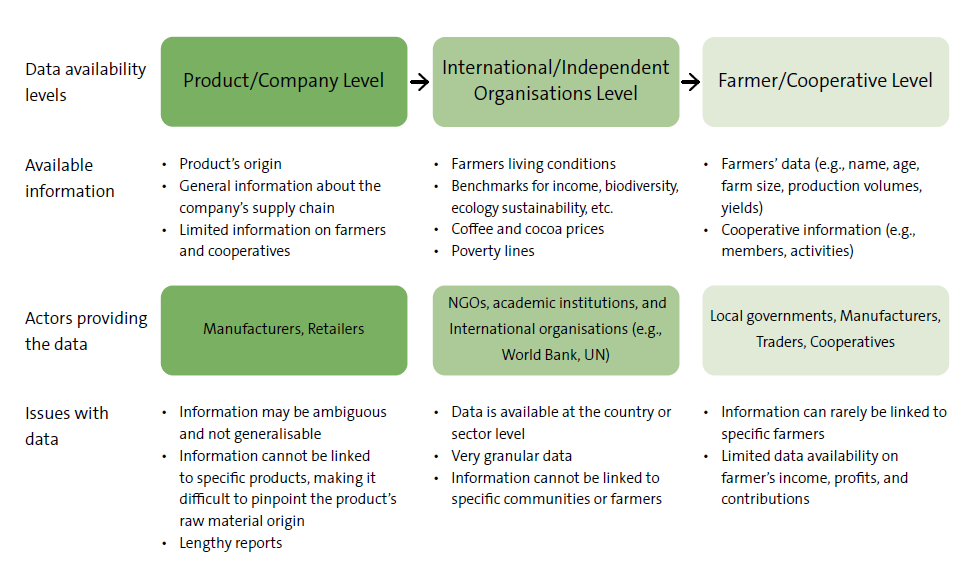Transparency and Traceability in the Supply Chains of Coffee and Cocoa: FSD’s New Report Unveils Challenges in These Industries
In a compelling exploration of the cocoa and coffee industries, a new FSD report highlights the economic, environmental, and social challenges faced by smallholder farmers, unravelling the status quo of persistent poverty and disparities and the pressing need for increased transparency and traceability.
A Call to Transform Cocoa and Coffee Industries
The cocoa and coffee industries stand as pillars of the global economy, providing livelihoods for millions of smallholder farmers. Despite their significance, these sectors grapple with challenges that echo across generations, from environmental degradation to human rights issues. The core problem of agricultural poverty among cocoa and coffee farmers demands urgent attention. Rising awareness has prompted calls for change, but limited transparency in supply chains hinders any progress. The report underscores traceability as a potential solution, emphasising the need for accurate data provision to empower smallholder farmers and create fair and sustainable global supply chains.
Bridging the Gap in Cocoa and Coffee Sectors
Although vital for millions of smallholder farmers, the cocoa and coffee industries are plagued by economic hardships, environmental concerns, and human rights issues. The economic disparity between smallholder farmers and downstream industry players is glaring, necessitating a profound responsibility on the part of leading companies to ensure human rights and prevent deforestation within their supply chains.
Global awareness has sparked collaborative efforts to address these negative impacts, with consumer-facing companies and their suppliers making public commitments. The surge in sustainability demand has led to various certification options, yet the report underlines the pitfalls of prioritising certification logos over true sustainability. Furthermore, greenwashing practices still mislead consumers and NGOs alike, exacerbating the climate crisis.
In essence, the report brings attention to the urgent need for increased transparency and traceability in cocoa and coffee supply chains, aiming to identify areas for improvement and develop strategies that benefit all stakeholders, especially smallholder farmers.
Transparency and Traceability: Linking Consumers to Smallholder Farmers
Consumer interest in understanding the journey of coffee and cocoa products has surged, with transparency and informed purchasing decisions at the forefront. The report delves into the critical link between consumers and smallholder farmers, introducing a methodology to assess available data and empower consumers to make conscious choices.
For a positive impact on smallholder farmers, transparency and traceability must serve their interests. However, achieving a democratic information landscape requires collaborative efforts, considering the burden on farmers during data collection and encouraging cohesive indicators. Effective collaborations can reduce resource expenditure and complexity while empowering farmers through inclusive, data-driven initiatives. The report stresses the need for consumer-oriented technology, urging companies, producers, and regulatory bodies to collaborate for transparency and traceability.

Data Availability: Unlocking the Farmer's Story
Consumers seeking information on the origin of their coffee and chocolate often encounter limited details. The report highlights the challenges in accessing data about smallholder farmers, citing efforts by non-profit organisations to fill data gaps. While multi-stakeholder initiatives aim to address sustainability, a truly democratic data landscape remains elusive, with limitations in accessibility and biases in collection and sharing.
In the quest for publicly available data, barriers persist, and biases present challenges. The report sheds light on the limitations of existing data, emphasising the need for open access to comprehensive information about smallholder farmers' living conditions.
By untangling the intricacies of coffee and cocoa supply chains, the report advocates for a more equitable, sustainable future that benefits all stakeholders, especially the backbone of these industries– the smallholder farmers.
Also read
-
Macrophages as key to treating liver fibrosis
Sabine Daemen is researching how certain macrophages can slow down fatty liver disease and fibrosis in order to develop new therapies.

-
Come to your senses: enrich your life and learning
Emilie Sitzia researches how we can rediscover our senses and use them to enhance our learning. This resulted in a colourfully illustrated book, 'Come to Your Senses', a senses-based learning guide.

-
Teacher Information Points at UM
UM faculties now host Teacher Information Points (TIPs) that offer local, “just-in-time” and on-demand support for teaching staff. The aim is simple: to provide help that is closely connected to day-to-day teaching practice.
